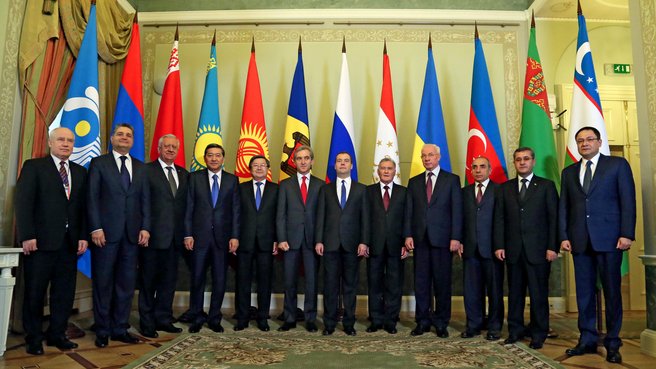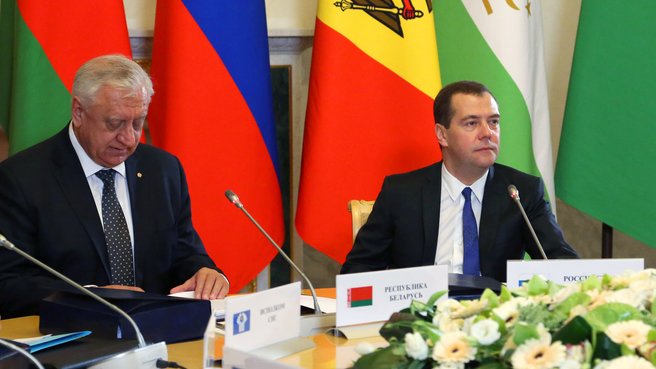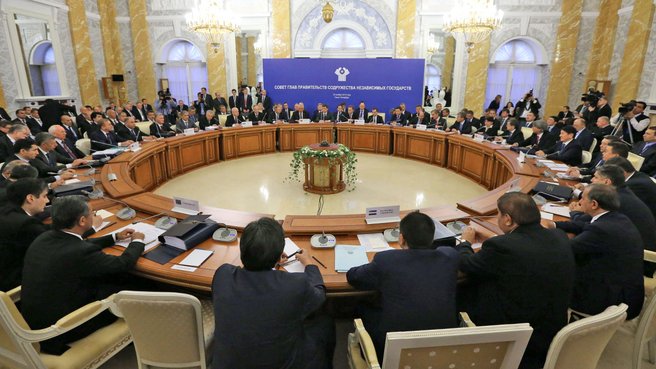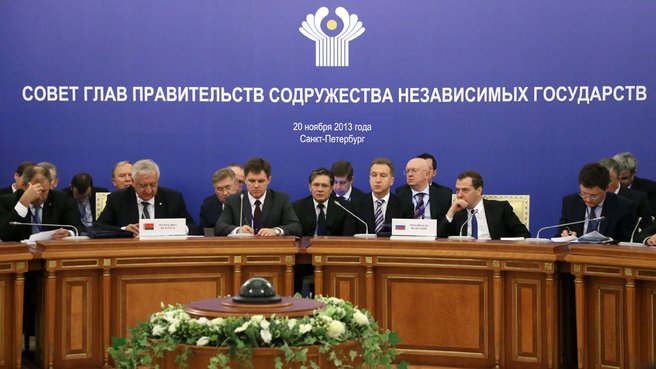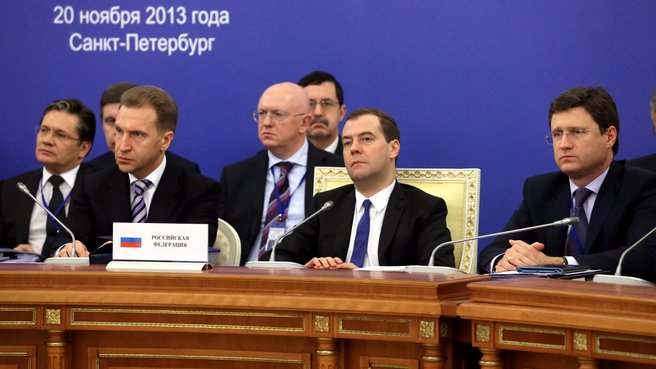Agenda: development of trade, economic, energy and cultural cooperation and financial and budgetary issues in the CIS.
Meeting of the Council of CIS Heads of State
Group photo of the heads of CIS delegations
Prior to the expanded meeting, a restricted attendance meeting was held of the Council of CIS Heads of State.
List of the CIS delegation heads:
First Deputy Prime Minister of the Republic of Azerbaijan Yaqub Eyyubov;
Prime Minister of the Republic of Armenia Tigran Sargsyan;
Prime Minister of the Republic of Belarus Mikhail Myasnikovich;
Prime Minister of the Republic of Kazakhstan Serik Akhmetov;
Prime Minister of the Kyrgyz Republic Zhantoro Satybaldiyev;
Prime Minister of the Republic of Moldova Iurie Leanca;
Prime Minister of the Russian Federation Dmitry Medvedev;
Prime Minister of the Republic of Tajikistan Oqil Oqilov;
Deputy Prime Minister of Turkmenistan Annamuhammet Gochyev;
Deputy Prime Minister of the Republic of Uzbekistan Adham Ikramov;
Prime Minister of Ukraine Mykola Azarov
During the expanded meeting, the parties discussed developing trade, economic, energy and cultural cooperation, as well as fiscal issues.
Following the meeting of the Council of CIS Heads of State, the parties took part in the signing of joint documents.
Dmitry Medvedev, Mikhail Myasnikovich and Mykola Azarov hold a joint news conference following the meeting of the CIS Council of Heads of Government
Transcript:
Mikhail Myasnikovich: Good afternoon, ladies and gentlemen.
The meeting of the CIS Council of Heads of Government has just concluded. We had a substantial discussion on all items of the agenda. We even went beyond it, reviewing what instruments we need to create to implement the signed agreements, in particular the one on the free trade zone. In total, we have discussed 30 issues and signed five international treaties that cover all spheres of our cooperation.
This year Belarus holds the Presidency of the Commonwealth of Independent States. We believe that the meeting of the CIS Council of Heads of State held in Minsk on 25 October, 2013 was a key event of the outgoing year. At this meeting the leaders of our countries took a very important decision and reaffirmed that our governments will develop and present a draft treaty on the formation of the Eurasian Economic Union in the first half of 2014. This is a new format, a new approach. Our governments will have a lot to do, all the more so since active talks are now underway with those states that wish to join the Customs Union and the Common Economic Space of the Russian Federation, Kazakhstan and Belarus. We do consider this in our work.
Belarus initiated and conducted a total of about 70 important events in 2013. I’d like to mention the work on the draft treaty for the CIS Free Trade Area and the development of international and cross-industry cooperation.
We believe that the Forum of Business People, the Belarusian Industrial Forum and a wide range of international and regional meetings were successful enough. Interregional cross-border cooperation has moved forward. A number of documents have been signed on environmental protection. All in all, about 40 events have been held in this sphere.
I’d like to emphasise that we have adopted an interstate programme of CIS innovative cooperation up to 2020. This is not just a framework programme. It is based on 11 significant innovation projects. Belarus is taking part in nine of them. The funding of these projects amounts to $190 million.
I’d like to repeat that much has been done to implement the agreement on the Free Trade Area. We would like to reduce substantially the number of restrictions on imports – from 61 (for Belarus) to three. We believe the market has much greater potential and this is a reserve for development. All in all, we estimate the CIS market at about three trillion dollars per year.
Today the Free Trade Area covers about 95% of interregional trade, which this shows that it is effective.
Are there sources of concern? We think we should still concentrate more on the economy. Let’s take an unbiased look at it. Economic growth is near the red line, so to speak. Analysts maintain growth has been about 1.8% in 2013. Last year it was much better, in fact almost twice as high – 3.4%.
The same is true of investments, which have considerably decreased compared to the past year. We have vast potential and our economies are mutually supplementary. Thus, we should switch from trade to forming joint ventures and not simply Belarusian-Russian, or Belarusian-Russian-Kazakh. They should be participants of the world market, global companies, and joint stock multinationals.
We have discussed these issues with Mr Medvedev today. The future belongs to such corporations. We should exceed the limits of national economies. It is possible to gain trade preferences, and we will continue doing this, but we will achieve more if we establish such joint ventures and not necessarily with CIS or Custom Union countries alone. This will be our common industrial policy about which we have been talking, but which we have not yet pursued. The CIS has infinite potential in this respect. We have just held the meeting of the CIS Council of Heads of Government in your wonderful city, and I would like to thank Mr Medvedev for creating comfortable conditions for our work. Thank you.
Dmitry Medvedev: Thank you. Dear journalists, Mr Myasnikovich described in detail what we have done today. Indeed, we discussed many issues at the meeting of the CIS Council of the Heads of Government. This year was Belarus, and next year Ukraine will take over the presidency of the CIS. I would like to thank our Belarusian colleagues for their effective work and wish success to our Ukrainian partners.
Indeed, today we have discussed many issues, which is typical for large events. They concern the most various areas – customs formalities, information protection, budgetary and fiscal relations, and the energy industry. We have also reviewed the education of scientists and teachers, healthcare cooperation, and cultural ties. Some of these documents are aimed at direct action whereas others represent a package of principles. This is how we work in the CIS format. We adopt many documents that must be specified further by laws and Government resolutions. Not everything is proceeding smoothly and many provisions remain on paper; however, some institutions are efficient and reflect the potential of the CIS.
This primarily applies to the economy and the early noted Free Trade Zone Agreement. We have discussed this in detail during our restricted attendance meeting. As Mr Myasnikovich said, we have departed far from the agenda, but we have arrived back at this issue without any problems. This is the positive result of our discussion. We have spoken about the potential of the agreement that we have just started implementing and the need to remove trade barriers. We have discussed industrial cooperation and the elaboration of a broad range of documents linked with the agreement. They are still works in process, but they will eventually become an inalienable part of this agreement. These and other issues were on the agenda of our restricted attendance meeting. Now, we understand better each other’s positions and I think that this is always useful.
Needless to say, integration is not limited to the economy. We are striving to promote our humanitarian contacts. Recently, Minsk played host to the eighth forum of the clerisy. This is a good thing. The forum gives young people from CIS countries the opportunity to share their ideas, make friends and, importantly, practice their Russian, which remains the language of communication in the CIS.
We are jointly preparing for the 70th anniversary of Victory in the Great Patriotic War and we have just signed a relevant document at the meeting of the council. Most preparations will take place during Ukraine’s presidency of the CIS and we are prepared to render comprehensive assistance to our Ukrainian partners.
This year, we have dealt with issues of environmental protection, which is important for each CIS country. Next year will be the Year of Tourism and today we have endorsed a special strategy for developing cooperation in tourism until 2020.
To sum up, we have discussed many issues. Some are simple, whereas others are very complicated. We have a common position on a number of issues, whereas some of our partners have not yet established their position on others.
By tradition, Russia supports practically all CIS initiatives. Therefore, I have signed all of the submitted documents – over 30. I believe that Russia should set an example of cooperation and integration across the board, including within the CIS.
We both praise and criticise the CIS, but it still remains the only venue uniting former Soviet republics on such a broad scale. Thank you.
Mykola Azarov: Ladies and gentlemen,
I would like to begin by highlighting the major contribution Belarus has made this year. The country’s leaders have taken great efforts and were instrumental in ensuring that all the mechanisms we had been working on for the 22 years of the existence of the Commonwealth of Independent States are working effectively. The agreement on the Free Trade Area was prioritised. I remember the autumn days of October 2011, when we finally signed the agreement. Now nearly all the parties to the agreement have ratified it and it will finally come into force.
I want to thank Mr Medvedev for the excellent organisation of our forum in this wonderful city. Maybe this is the reason why no matter how far we may stray, we will never go farther than the Gulf of Finland.
I would like to tell you that we have analysed the operation of the Free Trade Area Agreement in detail. Speaking about Ukraine, we posted a major growth in trade in 2012, but in 2013 our trade in the CIS market decreased by 25%. This means major economic losses for us. Ukraine faces very significant problems in this regard, and today we conducted a serious private discussion on how we will build our relations in the free trade area over the next few years to ensure trade growth. Ukraine is a country with an open economy. Our economy is export-oriented, so we want to remove all barriers to our trade.
What will Ukraine focus on when it chairs the CIS? We will certainly support the initiatives that have already been agreed. I will not go into detail because it would take too long even just to name them all. Mr Medvedev and Mr Myasnikovich have already talked about these initiatives. Ukraine intends to follow the example of the previous chairs and will also work to implement them. So what will we prioritise? I think that implementation of all the provisions of the 2011 Free Trade Agreement is extremely important. That is why we will suggest mechanisms that will fully make it possible to implement the agreement. First of all, this applies to the agreement on free access to pipeline transport. I am happy that we have recorded in the protocol of our today’s Council of Heads of Government the provision on continuing the agreement’s realisation and that we will continue efforts in this area.
The next important issue concerns an agreement on lowering and ultimately abolishing export duties on mutual trade. We discussed procedures for regulating government purchases. And, of course, we should focus on drafting an agreement on free trade in the services. This would make the CIS a unique market in that it would have two fundamental agreements, one for goods and the other for services. Our market is very large. I’d like to say that Ukraine’s trade with the CIS countries in mechanical engineering goods made by joint ventures is quite considerable, around 60% or even 70%. In other words, it’s obvious that we want these agreements to be effective.
I believe that what Mr Myasnikovich said about the slowing economic growth rate is a general trend. The figure is hovering around zero in the EU, with some countries showing negative growth and others reporting only minor increases. Unfortunately, the situation is the same in Ukraine: the economic growth rate decreased 0.6% in January-October this year. Our goal is to end the year with a positive, even if modest, result. We’d like to show economic growth next year, including with CIS assistance. We need this.
I’d like to thank Mr Myasnikovich and Mr Medvedev again for our productive discussions today. Thank you.
Question: Good afternoon. ITAR-TASS. I have a question for the prime ministers of Russia and Belarus. You spoke about a common industrial policy and about creating transnational corporations and joint ventures. But there is an issue that has been waiting for a solution for a long time. It is the idea of merging MAZ and Kamaz. What are the prospects, and what is the current status of this? Thank you.
Dmitry Medvedev: It sounds as though you were in the back seat of the bus that brought us here, and we didn’t notice you, because this is the very question I asked my colleague, Mr Myasnikovich. What are we going to do about this project? Unfortunately, we have not yet reached an agreement despite a common desire to do so, and although we believe that this would really benefit our countries and these two large companies. There are some legal difficulties and differing approaches to some issues, as well as business-related implications. But I believe that we should have long finished talking and started merging these companies, or lay this long-suffering issue to rest.
This definitely unnerves the two companies’ personnel and owners or their representatives, including the governments, in this case. Yet there is still no decision. In conclusion, I’d like to say that we have agreed to keep working on this issue constructively and to try to answer all the questions in the near future. It will be a shame if we fail.
Mikhail Myasnikovich: I think that this is not a simple litmus test… You chuckled while asking your question, as if to show that the project is completely impossible. But it is possible, and we can create a joint company. To begin with, these two large truck producers are rivals, including in the Customs Union market, and each of them wants to sell more: Kamaz wants to sell more Kamaz trucks and MAZ wants to sell more MAZ vehicles.
I believe that wise governments should pursue a coordinated policy in the production and sale of medium-duty trucks in the domestic market and should protect this market. This blanket pulling, which has lasted for almost two years, is having a negative impact on us. We are ceding our market to manufacturers from other countries. The number of MAZ and Kamaz vehicles sold in our domestic market is decreasing, and the niche is being filled by vehicles made in Europe, China and Japan. Therefore, we believe (we’ve reached an agreement on this issue with Mr Medvedev) that a decision on the management system for this project should be made this December. It was the most difficult issue.
We have coordinated the agreement, and international experts are working out the management plan for this holding company, which can only be effective as a 50:50 venture. I believe this project will be implemented.
Question: My name is Olesya Vysotskaya, and I am from the Belarus-1 television channel. I have a question for Mr Myasnikovich (Mikhail Myasnikovich), but, theoretically, this question is also addressed to everyone.
Dmitry Medvedev: This is interesting.
Question: Returning to the basic question, the common industrial policy, what initial steps can be taken in order to establish transnational corporations, and what ideal objective would we like to accomplish? Thank you.
Mikhail Myasnikovich: I believe, replying to your question, you could give an entire lecture about the essence of the common industrial policy. But I won’t do that because our stance implies that there should be a common market without any exceptions or restrictions. Moreover, commodity producers should work under equal conditions. Unfortunately, even at this point we can say that some state agencies of the Customs Union’s member-countries are manifesting certain state preferences, and that they are implementing some indirect measures in order to support national producers. And this influences the harmonisation of all these relations, as well as industrial co-production arrangements, to a certain extent. So I believe that various decisions to establish a common market without any exceptions or restrictions on January 2015, which have been made by the heads of state, and which are supported by the governments, will serve as the main foundation and the legal foundation for implementing the industrial policy. Of course, we are trying to improve product quality and obtain other competitive advantages (price, quality, service, etc.) in the course of competition. But we are not so wealthy that we can create alternative production facilities. If the Russian Federation successfully manufactures any specific product, then Belarus will implement its industrial policy with due consideration for the fact that this niche is dominated by Russian products. And we believe that our partners will take the same approach. At the same time, we should realise that this should be implemented in a competitive environment, so that government decisions don’t create overly comfortable conditions for specific commodity producers. We should struggle for this niche and for a place under the sun. At the same time, we should understand that these are our national commodity producers, so to say. And our wisdom should imply that we need to toe this line in order to make national products more competitive. And, at the same time, we should not forget that a national gross domestic value-added product is being created by each country.
As I see it, an agreed-upon industrial policy is quite feasible. See for yourselves: The European Union does not merely implement an industrial and economic policy. Barring competition, the European Union has a sufficiently well-developed institution, which allocates national production quotas, so as not to create problems for other commodity producers. We can see this in the neighbouring Baltic states, which joined the European Union not that long ago, and this is also manifested in other approaches. Therefore the Eurasian Economic Commission headed by Mr Viktor Khristenko should, in my opinion, work more actively in this direction and offer agreed-upon instruments because, if we instruct national ministries of the industry or the economy to do this, then this striving to obtain excessive benefits for themselves would be obvious. We have established the rather good and efficient Eurasian Economic Commission. It appears that the draft basic document on the common industrial policy should be discussed at the level of the national ministries.
Dmitry Medvedev: I don’t even know whether anything should be said or not. But, I would like to say the following, so that we would differ somewhat from each other: To my mind, the term “common industrial policy” is no less incomprehensible than the term “planned economy.” So, in addition to the current Customs Union, we need a common market and a common technical regulation system. If we do that, everything will be all right.
Mikhail Myasnikovich: By the way, speaking of technical regulations, which we are currently reviewing, I would like to make some additions and to support Mr Medvedev. There have been many debates on this issue.
Dmitry Medvedev: That’s right.
Question: Good afternoon. I am from the Financial Economic News Agency, and I would like to ask Mr Azarov a question. Just over a week from now, the Eastern Partnership summit will be held. And you are set to sign a European Union association agreement there. Does the summit agenda still include the signing of the agreement seven days before the event? Or have you heard any arguments from Russia or the European Union that will postpone the signing of the document?
And here is a question to all the Prime Ministers. If Ukraine signs an EU association agreement, will you discuss the introduction of trade restrictions and barriers in relations with Ukraine inside the free trade zone?
Mykola Azarov: Thank you for your question. Right now, Ukraine is focused on resolving its economic problems. We have spoken of them several times, and I mentioned them earlier today, too. As I see it, the planned preparations for the Vilnius summit are proceeding absolutely fine. The Supreme Council is working to approve the relevant documents. Currently, I repeat, we are focused on the year-end economic issues and the challenges we will have to tackle in 2014, which is likely to be an equally difficult year for us. Our plans, therefore, are not going to change. The government is planning to consider all these issues soon. Tomorrow, too, we will focus on economic development issues, primarily, the drafting of the 2014 budget. On 27 November, the government will review the main issues related to the preparations for 2014.
Dmitry Medvedev: The question was to everyone. As I see it, what to do is Ukraine’s internal affair. We have repeatedly offered our comments, and I have spoken on this matter as well. Our comments have not changed with regard to consequences, advantages and problems. I think, therefore, that it makes no sense to go back to this issue once more. I would like to wait for results and see how November ends for our friends in Ukraine. We’ll take it from there. But if you want to know whether we discussed the Treaty on the Free Trade Zone, Article 18 and Appendix 6 to this Treaty, my answer is: yes we did. It was discussed today because we must be honest with each other and create the legal framework for the future. The discussion was friendly and constructive. Any issue which is brought up for discussion should be considered.
Mikhail Myasnikovich: Deciding on the association or on accession to the Treaty is Ukraine’s internal affair. We in Belarus respect its choice, whatever it may be. As for another aspect of this issue, the Customs Union and the Common Economic Space have all the necessary tools for protecting the domestic markets of its three members. We will certainly use these tools, if we find that we must.
Question: Ukrainian News Information Agency, Yevgeny Buderatsky. Mr Medvedev, here’s my first question. If Appendix 6 was discussed, what kind of timeframe are we looking at? If Ukraine does sign an association agreement with the EU, will Appendix 6 be become effective right away?
My second question concerns the pipeline transport. It was mentioned today that talks had come under way. But why weren’t these held earlier, if the Treaty on the Free Trade Zone says that they should have happened in March? And can we expect results in six months, as the treaty says?
Dmitry Medvedev: Thank you. No one knows when and what will become effective – (perhaps they do in heaven) – for the simple reason that we don’t know what will happen and how the commodity flows will shape up. We have no way of knowing whether we’ll have to use the arsenal of means stipulated by Article 18 of the TZFT and Appendix 6 thereto. We simply stated that these provisions were in existence. But I don’t know when they will be applied. If a decision on our part is required, we will act in conformity with the Treaty. Accordingly, we will first hold consultations, as stipulated by Appendix 6. The decision can be applied if a massive delivery of certainly priced goods or a threat thereof is ascertained. But for now, this is not on our agenda. We don’t know what will happen next. We can only make conjectures.
That’s exactly what we discussed today. But the provision is in place and, as Mr Myasnikovich has justly observed, if there is a provision, the member countries of the Customs Union – and, in fact, other countries, too – will apply this provision if the situation so requires. This provision of the Treaty on the CIS Free Trade Zone applies not only to the three countries present here, but to other countries as well.
With regard to the minutes on the pipeline transport, we planned such a document, indeed. We discussed this today, too. I said that this was likely the trickiest of all the documents that had been proposed in furtherance of the free trade zone treaty. We haven’t broken off the talks, although our positions were poles apart. Today I reminded our partners, primarily Ukraine, that we have different obligations, after all. Unlike Ukraine, Russia, for example, is not a party to the Energy Charter agreements. We must keep this in mind, just like several other international obligations. But we have agreed that the work on these documents will continue. I wouldn’t give any deadlines now. But if we manage to square all positions, we will certainly come to terms. Whether this happens three months from now, six months, or later – we’ll have to wait and see.
Thank you. Goodbye.
Mykola Azarov: Thank you.
Mikhail Myasnikovich: Thank you.
